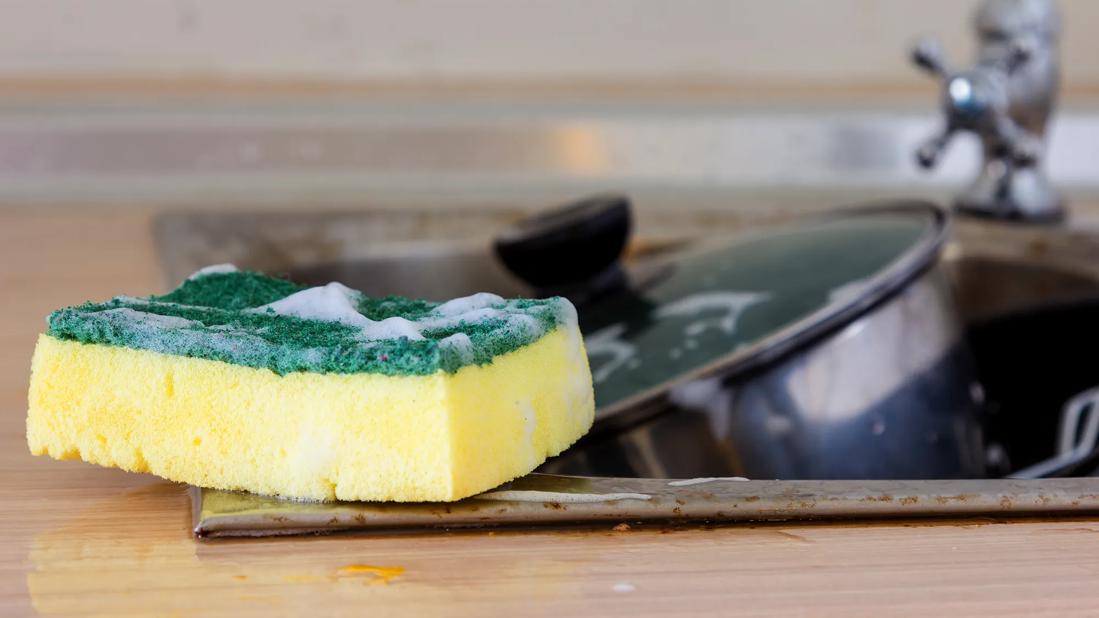Washing your hands, thoroughly cleaning kitchen tools and preparing meat separately can reduce the risk of foodborne illness

Image content: This image is available to view online.
View image online (https://assets.clevelandclinic.org/transform/6c1006e9-766c-4e16-aa90-135d90213838/kitchen-sponge-dishes-176226925)
Kitchen sponge sitting on edge of dirty sink filled with dirty pans
It’s not your imagination: There have been lots of food recalls in the past few years. Cross-contamination is responsible for empty shelves in grocery stores around the world.
Advertisement
Cleveland Clinic is a non-profit academic medical center. Advertising on our site helps support our mission. We do not endorse non-Cleveland Clinic products or services. Policy
But what exactly is cross-contamination? And how can you keep yourself and your family safe? We asked pediatric infectious disease specialist Frank Esper, MD.
Cross-contamination happens when an object with allergens, toxic materials or illness-causing microbes like bacteria or viruses touches (and contaminates) something or someone else. You can use the term “cross-contamination” to describe a wide range of situations. But we often use it to talk about food safety.
Cross-contamination can happen in many ways for many reasons, but poor sanitation and food handling practices usually play a role. It’s one of the tactics germs use to move from place to place and person to person.
Dr. Esper explains that food can become cross-contaminated at any time.
“It could happen anywhere from farm to table,” he says. “Many major players in the food processing industry have merged, so there are only a few distributors responsible for many states, if not entire regions. That’s why, when you hear about an outbreak of a foodborne illness, it’s usually across multiple states, grocery stores or restaurants.”
The same is true of food allergens.
“The particles from, for example, a peanut, can move within the environment, leading to cross-contamination,” Dr. Esper explains. “So, you can have an allergic reaction, even though nobody in the production process worked directly with peanuts.” That’s why packaged foods note if they’re made in a facility that also makes products with common allergens.
Advertisement
Cross-contamination can also happen in your kitchen, when you touch a contaminated surface or food and don’t wash your hands.
“We, as humans, tend to use our hands a lot,” he continues. “And when our hands come into contact with our mouths and eyes, germs can get in.”
Cross-contamination is a common source of food poisoning, foodborne illnesses and allergic reactions. The germs that get into your food are usually bacteria like:
The following signs could mean that something you ate was contaminated by bacteria:
If you have a food allergy, cross-contamination can cause anything from a mild itchy mouth to a severe allergic reaction called anaphylaxis. Minor symptoms can be managed with an over-the-counter antihistamine. But if you have a history of severe allergies or anaphylaxis, keep an EpiPen® on hand when making and eating meals.
There’s no way to completely avoid cross-contamination — it often happens long before you pick out your groceries or order a meal. But there are things you can do to reduce the risk of it happening in your kitchen. Dr. Esper shares some tips to cut down on the risk of cross-contamination.
Advertisement
If, despite your best efforts, you contract a foodborne illness or experience food poisoning, it can be miserable. But it should get better on its own. Call a healthcare provider if your symptoms are severe, get worse with time or last more than two days. You may need IV fluids or prescription medication.
Foodborne illnesses pose a greater risk for certain people. Call a provider as soon as you notice symptoms if:
Advertisement

Sign up for our Health Essentials emails for expert guidance on nutrition, fitness, sleep, skin care and more.
Learn more about our editorial process.
Advertisement
Leftovers can be kept in the fridge for three to four days or frozen for three to four months
Ultimately, rice is safe to eat, but the type, where it’s grown and how you cook it may be factors to consider
Extended outages lasting more than four hours can make food in your fridge unsafe to eat
Make your home a no-fly zone by cleaning your drains, refrigerating your produce and DIYing a fruit fly trap
Microwaves use non-ionizing radiation and haven’t been shown to cause cancer — follow food safety practices and use microwave-safe containers
Once perishable food hits the table, it’s typically good for about two hours
Color, texture, smell and expiration date all hold important clues
Warning: A popular TikTok hack to extend the life of avocados could lead to food poisoning
Although it could be used as a moisturizer, this new trend is not recommended
Communicating clear limits helps protect your time, energy and emotional well-being
High cholesterol can be genetic, but testing and treatment can lower your heart disease risk